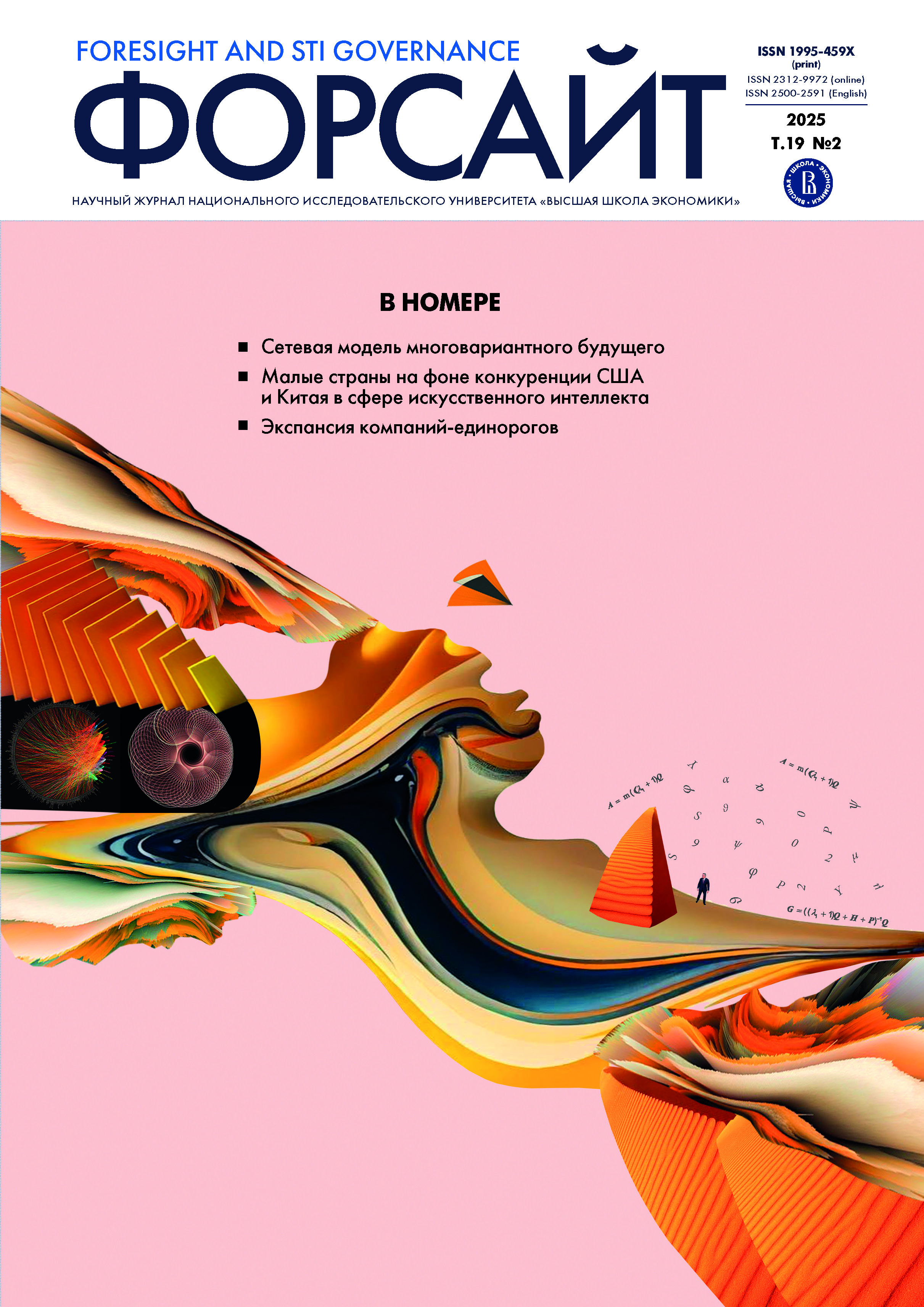Аннотация
Стремительное развитие технологии искусственного интеллекта (ИИ) ведет к усилению глобальной конкуренции, меняя динамику соотношения сил между разными странами. В статье анализируются влияние распространения ИИ на перспективы соперничества в оборонной сфере между США и Китаем, а также эффекты этого процесса для небольших стран с ограниченным геополитическим влиянием. На основании обзора тематической литературы и опроса экспертов составлен набор возможных сценариев на период до 2050 г., которые описывают разные варианты развития противостояния США и Китая на Земле и в космосе, отражают соответствующие векторы стратегий для малых стран в том или ином контексте. Сценарии могут служить стратегической канвой для разработки проактивной политики национальной безопасности с учетом меняющегося международного ландшафта. Предложенные рекомендации направлены на то, чтобы «выровнять игровое поле» и помочь таким субъектам не только решать проблемы, связанные с развитием ИИ в военной сфере, но и использовать возможности, возникающие в результате технологических сдвигов. Представленные выводы формируют потенциальную основу для разработки стратегий национальной безопасности даже в условиях институциональных и инфраструктурных ограничений. Лица, принимающие решения, могут ориентироваться в сложной среде, динамизм которой во многом определяют технологии ИИ.
Литература
Boulanin V., Saalman L., Topychkanov P., Su F., Carlsson M.P. (2020) Artificial Intelligence, Strategic Stability, and Nuclear Risk, Stockholm: Stockholm International Peace Research Institute.
Cheung T.M. (2022) Innovate to Dominate the Rise of the Chinese Techno-Security State, Ithaca, NY: Cornell University Press.
De Jouvenel B. (1964) L’art de la conjecture, Monaco: Ed du Rocher.
Fernández-Montesinos F. (2019) La inteligencia artificial como factor geopolítico, Madrid: Instituto Español de Estudios Estratégicos.
Gardner N. (2021) Clausewitzian Friction and Autonomous Weapon Systems. Comparative Strategy, 40(1), 186–198. https://doi.org/10.1080/01495933.2021.1853442
Godet M. (1994) From Anticipation to Action: A Handbook of Strategic Prospective, Paris: UNESCO.
Godet M., Durance P. (2011) Strategic foresight: For corporate and regional development, Paris: UNESCO.
He T., Ji Y. (2023) China’s Techno-Economic Statecraft Amid US-China Strategic Rivalry: AI and the “New Whole-State System”. Orbis, 67(4), 605–625. https://doi.org/10.1016/j.orbis.2023.08.008
Horowitz M., Kania E.B., Allen G.C., Scharre P. (2018) Strategic Competition in an Era of Artificial Intelligence. Washington, D.C: Center for a New American Security (CNAS).
Horowitz M., Kahn L., Mahoney C. (2020) The Future of Military Applications of Artificial Intelligence: A Role for Confidence-Building Measures? Orbis, 64(4), 528–543. https://doi.org/10.1016/j.orbis.2020.08.003
Hunter L.Y., Albert C.D., Henningan C., Rutland J. (2023) The military application of artificial intelligence technology in the United States, China, and Russia and the implications for global security. Defense & Security Analysis, 39(2), 207–232. https://doi.org/10.1080/14751798.2023.2210367.
Johnson J. (2019) Artificial intelligence and future warfare: Implications for international security. Defense & Security Analysis, 35(2), 147–169. https://doi.org/10.1080/14751798.2019.1600800
Johnson J. (2020) Artificial Intelligence in Future Hyper-Warfare: A Perfect Storm of Instability? The Washington Quarterly, 43(2), 197–211. https://doi.org/10.1080/0163660X.2020.1770968
Johnson J. (2021) Artificial intelligence and the future of warfare: The USA, China, and strategic stability, Manchester: Manchester University Press.
Larson E. (2021) The Myth of Artificial Intelligence, Cambridge, MA: Belknap.
Lu S.-M. (2021) The CCP’s Development of Artificial Intelligence: Impact on Future Operations. Journal of Social and Political Sciences, 4(1), 93–105. https://doi.org/10.31014/aior.1991.04.01.255
Malmio I. (2023) Ethics as an enabler and a constraint – Narratives on technology development and artificial intelligence in military affairs through the case of Project Maven. Technology in Society, 72, 102193. https://doi.org/10.1016/j.techsoc.2022.102193
Mearsheimer J. (2014) The Tragedy of Great Power Politics, New York: Norton & Company.
Mojica F.J. (2005) La Construcción del futuro: Concepto y modelo de prospectica estratégica, territorial y tecnológica, Bogotá: Universidad Externado de Colombia.
Morgan F.E., Boudreaux B., Lohn A.J., Ashby M., Curriden C., Klima K., Grossman D. (2020) Military Applications of Artificial Intelligence: Ethical Concerns in an Uncertain World, Santa Monica, CA: RAND Corporation.
Morgenthau H. (2005) Politics Among Nations: The Struggle for Power and Peace (7th ed.), New York: McGraw Hill Education.
Mori S. (2018) US Defense Innovation and Artificial Intelligence. Asia-Pacific Review, 25(2), 16–44.
Payne K., Warbot I. (2021) The Dawn of Artificially Intelligent Conflict, New York: Oxford University Press.
PWC (2017) Sizing the prize: What’s the real value of AI for your business and how can you capitalise?, London: PWC.
Schwartz P. (1997) The Art of the Long View: Planning For the Future in an Uncertain World, New York: John Wiley & Sons.
Tsoukas H.T., Shepherd J. (2004) Coping with the future: Developing organizational foresightfulness. Futures, 36(2), 137–144. https://doi.org/10.1016/S0016-3287(03)00146-0
Velázquez R., González S. (2016) El realismo clásico. In: Teorías de las Relaciones Internacionales en el siglo XXI: Interpretaciones criticas desde Mexico (eds. J.A. Schiavon Uriegas, A.S. Ortega Ramírez, M. López-Vallejo Olvera, R. Velázquez Flores), México: AMEI, pp. 285–295.
Viglione G. (2020) China is closing gap with United States on research spending. Nature News, 15.01.2020. https://doi.org/10.1038/d41586-020-00084-7
Waltz K. (1979) Theory of International Politics, New York: McGraw-Hill.
Whitehead A. (1967) Modes of Thought, New York: MacMillan Company.

Это произведение доступно по лицензии Creative Commons «Attribution» («Атрибуция») 4.0 Всемирная.

